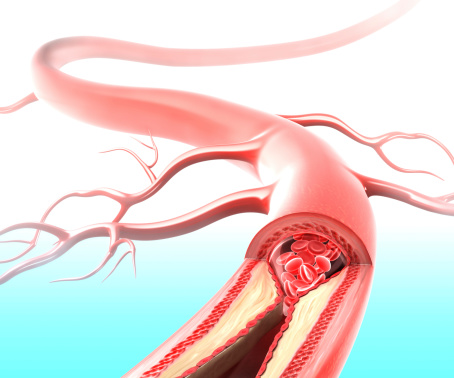FDA Label Change on Approved Testosterone Products: Blood Clots Unrelated to Polycythemia

The U.S. Food and Drug Administration (FDA) has asked all manufacturers of FDA-approved testosterone products to include a warning about blood clots in the veins that are notrelated to polycythemia.
Polycythemia refers to increased levels of red blood cells and is a possible side effect of testosterone treatment.
FDA-approved testosterone products already carry a warning about polycythemia-related blood clots. However, this most recent warning expands on that to include blood clots not associated with polycythemia.
In a statement released June 19, 2014, the FDA stated, “The risk of venous blood clots is already included in the labeling of testosterone products as a possible consequence of polycythemia, an abnormal increase in the number of red blood cells that sometimes occurs with testosterone treatment. Because there have been postmarket reports of venous blood clots unrelated to polycythemia, FDA is requiring a change to drug labeling of all testosterone products to provide a more general warning regarding venous blood clots and to ensure this risk is described consistently in the labeling of all approved testosterone products.”
Patients may see different terms used to describe blood clots:
- Deep vein thrombosis (DVT) occurs when blood clots in a vein deep inside the body, such as in the thigh or in the lower leg. The blood clot is a clump of blood that can block blood flow through the vein. If the blood clot separates and travels through the body on its own, it is called an embolus.
- Pulmonary embolism (PE) occurs when an embolus travels to the lungs and blocks an artery there. PE is a serious situation that can lead to organ damage or death.
- Venous thromboembolism (VTE) is the term that describes DVT and PE when they happen together.
In February, the FDA announced a plan to review the safety of testosterone products after studies raised concerns about stroke, heart attack, and death. The new warning has nothing to do with this investigation.
Testosterone therapy is often prescribed to men whose bodies don’t produce enough testosterone on their own, a condition called hypogonadism. Genetic issues and chemotherapy are other reasons a man might be treated with testosterone therapy.
Men who are concerned about the new FDA warning are encouraged to speak to their healthcare providers.
Resources
MedicineNet.com
“Polycythemia (Elevated Red Blood Cell Count)”
(Reviewed: January 22, 2014)
http://www.medicinenet.com/polycythemia_high_red_blood_cell_count/article.htm
Johns Hopkins Medicine
“What is DVT/VTE?”
http://www.hopkinsmedicine.org/innovation_quality_patient_care/areas_expertise/infections_complications/dvt/what_is_dvt_vte.html
National Heart, Lung, and Blood Institute
“What Is Deep Vein Thrombosis?”
(October 28, 2011)
http://www.nhlbi.nih.gov/health/health-topics/topics/dvt/
U.S. Food and Drug Administration
“FDA adding general warning to testosterone products about potential for venous blood clots”
(June 19, 2014)
You may also be interested in...
Other Popular Articles

What Is the Average Penis Size?
If you have ever wondered how your penis compares to others in terms of size, you are not alone. Many men are curious to know how their penises stack up compared to the average. Unfortunately, general curiosity can sometimes give way to full-on obsession and anxiety about penis size. This can be an unhealthy and often unnecessary fixation, especially because most men who think their penises are too small have perfectly normal-sized penises.

What Is Jelqing, and Does It Actually Work?
The term “jelqing” refers to a set of penis stretching exercises that some believe can make the penis bigger. Although the practice has gained attention and popularity in blogs and internet forums in recent years, there is no scientific evidence that it is an effective way to permanently increase the size of one’s penis. In fact, in some cases, jelqing may actually cause damage to the penis, so it is a good idea to get all the facts before setting off to try it.

What Is Sensate Focus and How Does It Work?
Sensate focus is a technique used to improve intimacy and communication between partners around sex, reduce sexual performance anxiety, and shift away from ingrained, goal-oriented sexual patterns that may not be serving a couple.

Can Sex Reduce Menstrual Cramps?
The SMSNA periodically receives and publishes ‘guest editorials.’ The current article was submitted by Mia Barnes, a freelance writer and researcher who specializes in women's health, wellness, and healthy living. She is the Founder and Editor-in-Chief of Body+Mind Magazine.
Having sex while you experience menstrual cramps is healthy and can provide significant benefits. While it might not be the first activity that comes to mind when your PMS or period cramping begins, many people enjoy sex to reduce menstrual cramps, experience increased pleasure and benefit from other advantages. Learn more about having sex while menstrual cramps are happening and how it can help your body.

How Long Does It Take the Average Man to Ejaculate?
On average, it takes a man between 5 to 7 minutes to orgasm and ejaculate during sexual intercourse.

Can Sex Throw off Your Vaginal pH Balance?
The SMSNA periodically receives and publishes ‘guest editorials.’ The current article was submitted by Mia Barnes, a freelance writer and researcher who specializes in women's health, wellness, and healthy living. She is the Founder and Editor-in-Chief of Body+Mind Magazine.
Your vagina is a pretty powerful organ. It is a pathway for menstrual blood and babies. It also is a main player in sexual intercourse. You might hear about your vagina’s pH and worry that yours is at risk. Here’s what to know about vaginal pH, including the impacts sex could have.
You are prohibited from using or uploading content you accessed through this website into external applications, bots, software, or websites, including those using artificial intelligence technologies and infrastructure, including deep learning, machine learning and large language models and generative AI.

